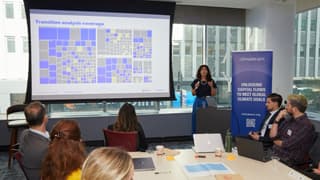Understanding the reality of corporate transitions is the cornerstone of accountability. It’s the first step in instilling integrity in existing commitments, pushing for necessary policies and regulations, unlocking financing, and creating incentives for leaders to emerge.
At Climate Week New York 2023, Arc and ClimateWorks Foundation brought together over 70 practitioners to explore how we can maximize our impact as a community.
What came through very powerfully from the workshop discussions was that there are many opportunities for us to find efficiencies and accelerate our collective impact. Read the full summary in the report and see below if you would like to get involved in driving this forward.

Key takeaways
1. Building momentum for corporate action
Is critical to reducing emissions at the scale needed to deliver the Paris Agreement. We need to demonstrate just how exponential green economy growth is while highlighting gaps and investment opportunities. Data and analysis, progressive policies and incentives are critical enablers here.
2. Corporate action and accountability.
The ecosystem needs data and tools for fostering impact in four areas: data standards and accounting; climate scenarios and modelling exercises; making the business case for transition planning; and supplier engagement.
3. Campaigning.
Some nonprofits are generators of data and toolsets as well as end users. As such, some organizations have a disproportionate amount of in-house data experts analyzing the same kinds of data that are already being studied elsewhere, while other organizations have to pay high access fees for information, duplicating costs across the community.
4. Unlocking private financing.
To make net-zero-aligned decisions, financial institutions need more and sharper science-aligned data and analysis on corporate transition plans, tailored to different needs and use cases. Data needs to be comparable, transparent and machine-readable while maintaining a high-integrity approach.
5. Policy and regulation.
We need to provide policymakers and regulators with the resources and support to make use of the increasing amount of data and analysis coming online, as well as increase compliance and enforcement mechanisms.
Next steps
At Arc, we are committed to enabling and supporting the systemic collaboration needed to ensure that we are collectively building a system that works for all. From these findings, we have identified the priority needs that we will be taking forward:
- Invest in datasets: more coverage and sharper transition metrics.
- Map and recommend how data collection and analysis could be streamlined between organizations.
- Develop systems and processes for the interoperability of data.
- Build and provide open access to a new transition analysis platform.

Like to be involved?
We will be convening interested parties in early 2024 to explore how we take this work forward together. If you would like to join this effort, please do get in touch.




